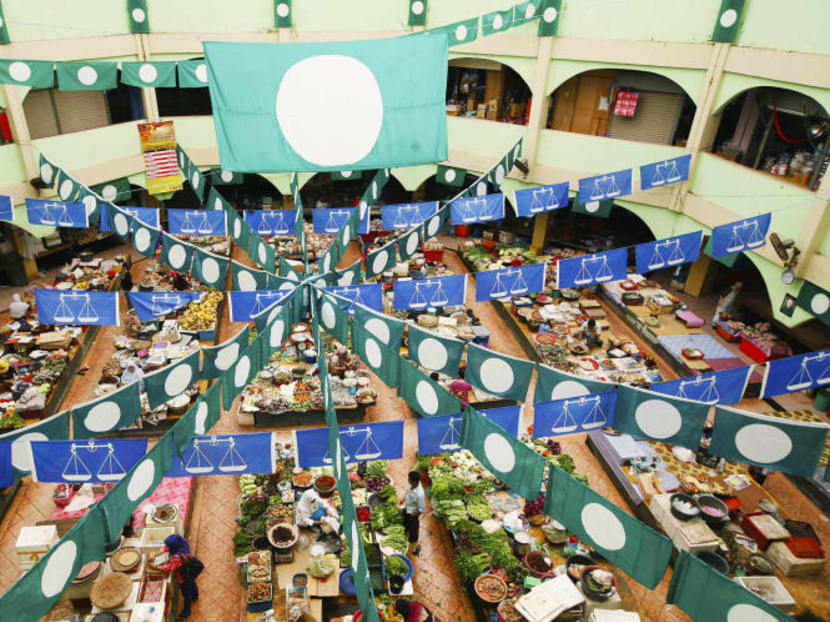Analysts see Malaysia's opposition PAS losing stronghold Kelantan
KUALA LUMPUR — Islamist party Parti Islam SeMalaysia (PAS) is unlikely to surpass its result from the 2013 General Election, according to analysts who concluded the Islamist party was overreaching with its plan to contest 130 parliamentary seats.

Flags of Malaysia's ruling Barisan Nasional (BN) coalition (blue) and opposition Parti Islam SeMalaysia (PAS) (green) on display at a market in Kota Baru, Kelantan. Analysts say PAS will struggle to defend Kelantan, which it has ruled since 1990, against both its former allies and rival BN Photo: Reuters
KUALA LUMPUR — Islamist party Parti Islam SeMalaysia (PAS) is unlikely to surpass its result from the 2013 General Election, according to analysts who concluded the Islamist party was overreaching with its plan to contest 130 parliamentary seats.
They further said PAS, which is now hostile to parties of the opposition Pakatan Harapan coalition, will also struggle to defend Kelantan, which it has ruled since 1990, against both its former allies and the ruling Barisan Nasional (BN).
PAS only won 21 of the 73 seats it contested as part of the defunct Pakatan Rakyat coalition at GE 2013. Its best result was in the 1999 polls, when it won 27 seats as part of the Barisan Alternatif lineup, which is also defunct.
PAS president Abdul Hadi Awang is aiming to win 40 parliamentary seats in the 14th general election that must be called by June 24, in the belief that this would allow his party to be "kingmakers" to the next government.
"This is a meaningless effort. It is a waste of resources and energy," said Universiti Malaysia Sarawak (UNIMAS) political analyst Jeniri Amir.
"They won't be able to perform better than how they did in 2013, and their performance in 2013 was due to support from Pakatan, and not entirely their own strength."
Prof Jeniri said that PAS was "digging its own grave" with the extent of its ambitions.
Without the shared resources of its allies and fighting on two fronts, he believed the Islamist party would be stretched too thin to be able to put up any significant fight outside its safe seats.
Prof Jeniri also suggested that the aspiration was only to fuel the party's attempt to portray itself as a major player in the Malaysian political landscape, against whispers that it was sliding into irrelevance.
"By contesting in these seats and not collaborating (with other major parties), this just reflects the ego of their leader," he said.
He also said BN now has the "upper hand" in Kelantan as some of PAS' support will be split by splinter party Amanah, which is with Pakatan Harapan.
While BN and PAS appear to share cordial ties at the federal level, the former said it fully intended to regain the east coast state from the Islamists.
"There is a good chance BN can actually wrest back Kelantan from PAS," Prof Jeniri said.
Pacific Research Centre principal adviser Oh Ei Sun also said it was unlikely PAS would do any better than how it fared in the last election five years ago.
He said this would be particularly apparent outside of rural areas as the Islamist party had previously been able to tap its former allies' network and appeal.
"After they left Pakatan they also lost Pakatan's opposition support base from the other two component parties," he said.
Mr Oh said that in constituencies where PAS fields candidates against both BN/Umno and PH candidates, candidates from the Malay nationalist party would gain.
He similarly suggested that PAS could finally lose Kelantan after nearly three decades in power there.
Universiti Kebangsaan Malaysia (UKM) political analyst Faisal Hazis also concluded that the PAS plan to challenge for 130 federal seats was "overly ambitious".
Mr Faisal pointed out that the party's election performances were notably better only when it was part of a coalition with other major opposition political parties.
The Islamist party's vitriol against its former opposition allies and seemingly warm ties with Umno now could also cost it support from voters who may be concerned about PAS' true allegiances, he added.
"From 2008 to 2013, we saw PAS transform from a niche party to a national opposition party. But they don't have that centrism going into the next election; I don't see how they are going to capture non-Malay votes," he said.
He said the balmy ties with Umno made it difficult to set apart from the latter, and would hurt the Islamist party's claim of being a credible alternative to the BN lynchpin.
This was crucial for PAS to have any chance of securing the numbers that Mr Hadi said would make his party kingmakers.
"If they want to win 40 seats, the bulk of votes should come from Umno supporters. But they are not offering an alternative to Umno," Mr Faisal said.
He said that the threat of PAS losing Kelantan is real, as BN "traditionally" benefited from any multi-cornered contests that split the opposing vote in its favour.
"Once you stop criticising Umno and stop offering an alternative, in what way would people vote for you?" he said. THE MALAY MAIL ONLINE






